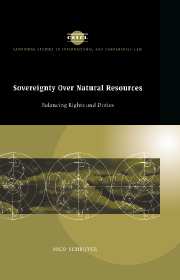Book contents
- Frontmatter
- Contents
- List of boxes, figures and tables
- Preface
- Acknowledgments
- List of abbreviations
- List of main symbols used in UN documents
- Glossary
- Table of cases
- 1 Introduction
- PART I The birth and development of the principle: the UN General Assembly as midwife
- PART II Natural-resource law in practice: from creeping national jurisdiction towards international co-operation
- PART III Balancing rights and duties in an increasingly interdependent world
- Introductory remarks to Part III
- 9 Rights and claims: seeking evidence of recognition in international law
- 10 Duties: the other side of the coin
- 11 Sovereignty over natural resources as a basis for sustainable development
- Appendices
- Bibliography
- Index
- Books in the series
9 - Rights and claims: seeking evidence of recognition in international law
Published online by Cambridge University Press: 23 October 2009
- Frontmatter
- Contents
- List of boxes, figures and tables
- Preface
- Acknowledgments
- List of abbreviations
- List of main symbols used in UN documents
- Glossary
- Table of cases
- 1 Introduction
- PART I The birth and development of the principle: the UN General Assembly as midwife
- PART II Natural-resource law in practice: from creeping national jurisdiction towards international co-operation
- PART III Balancing rights and duties in an increasingly interdependent world
- Introductory remarks to Part III
- 9 Rights and claims: seeking evidence of recognition in international law
- 10 Duties: the other side of the coin
- 11 Sovereignty over natural resources as a basis for sustainable development
- Appendices
- Bibliography
- Index
- Books in the series
Summary
The grammar of rights
For a long time the grammar of permanent sovereignty was a grammar of rights: the right to dispose freely of natural resources, the right to expropriate, the right to compensation for damages to natural resources caused by third States or enterprises, to mention just a few. The invocation of such rights often led to serious controversy between States, especially between Western and developing countries. Various attempts were made to formulate, in general terms, the relevant rules of international law in treaty law, for example in the 1948 Havana Charter, the 1965 ICSID Convention, the 1966 Human Rights Covenants, the 1967 OECD Draft Convention on the Protection of Foreign Property and the 1982 Law of the Sea Convention. In addition, efforts were made, in the context of both intergovernmental and professional bodies, to formulate ‘codes of conduct’, ‘declarations’ or ‘guidelines’.
Claims to and exercise of ‘sovereign’ rights have often been the subject of diplomatic protest and international litigation, occasionally before the International Court of Justice (such as the Anglo-Iranian Oil Company case) but more often before international arbitration tribunals. Examples of the latter include the Libyan oil nationalization tribunals, ICSID tribunals and the Iran–US Claims Tribunal. Finally, it goes without saying that heated debates and duels between lawyers occurred and these have given rise to an abundant literature describing historic controversies in which the battle lines in this field have been drawn.
- Type
- Chapter
- Information
- Sovereignty over Natural ResourcesBalancing Rights and Duties, pp. 258 - 305Publisher: Cambridge University PressPrint publication year: 1997



